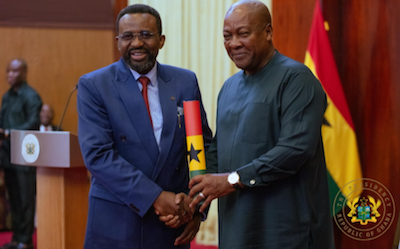In a significant development, Dr. Johnson Asiama, the newly appointed Governor of the Bank of Ghana, announced on Thursday, October 16, 2025, that Ghana is on track to conclude its $3 billion Extended Credit Facility with the International Monetary Fund (IMF) by 2026.
Speaking at a high-profile event, Asiama highlighted the nation’s steady progress in meeting fiscal targets, aligning with President Mahama’s earlier pledge in May 2025 to steer the country out of the financial support program. This milestone comes as Ghana continues to implement robust economic reforms aimed at stabilizing its currency and boosting investor confidence.
The announcement follows a recent staff-level agreement with the IMF on October 9, 2025, which unlocked an additional $385 million, bringing total disbursements to over $2.8 billion. This financial boost underscores the government’s efforts to restructure debt and enhance revenue collection, key components of the three-year plan initiated in 2023. Asiama’s optimistic outlook is supported by signs of economic recovery, including a decline in inflation and growth in agriculture and services, which are expected to lower poverty rates by next year.
BoG Governor Shockingly Reveals When Ghana Will Exit $3 Billion IMF Program
Reactions on social media platform X reflect a mix of enthusiasm and skepticism. Supporters of the ruling party have lauded the governor’s decisive leadership, while opposition voices have raised concerns about the sustainability of the recovery, especially with the 2024 elections looming.
The debate highlights the critical role of economic policy in shaping Ghana’s political landscape, with many citizens hopeful that exiting the IMF program will reduce living costs and strengthen the cedi.Looking ahead, the successful exit from the IMF program could open doors for Ghana to re-enter international and domestic capital markets, as outlined by President Mahama.
This move is anticipated to fuel long-term growth and development, with the World Bank projecting a 4.3% growth rate for 2025 despite global uncertainties. As the nation edges closer to this goal, all eyes will be on the government’s ability to maintain fiscal discipline and complete ongoing debt restructuring.
For now, Dr. Asiama’s bold declaration has sparked a wave of optimism, positioning Ghana as a potential model for economic turnaround in the region. With the IMF program’s end in sight, the focus shifts to building a resilient economy that can thrive independently, a prospect that could redefine Ghana’s future on the global stage.



